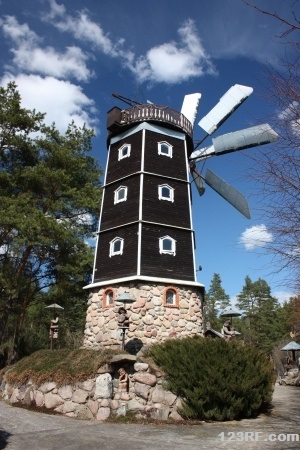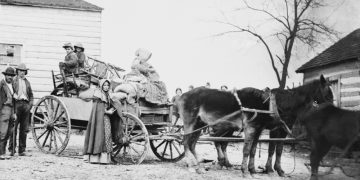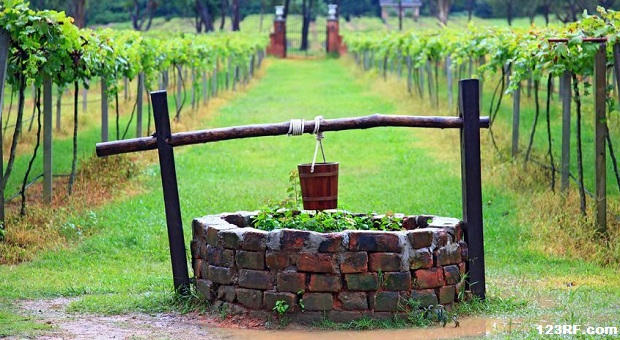Between high energy costs (which are expected to keep rising) and the uncertainty in the world today, the idea of going “off-grid” is gaining popularity. Preppers aren’t the only ones who are thinking in these terms, as others are seeing the potential benefits of getting off-grid and not having to pay their monthly utility bills.
Those that do end up saving a bundle on their monthly budget, as well as gaining the security of not having to depend upon our aging infrastructure.
Of course, going off-grid has different meanings to different people. Some merely think of it as becoming self-sufficient in energy requirements, while other think of totally eliminating their dependency on utility services and becoming self-sufficient in all areas of life.
A lot of this depends on where a home is located, as it has always been much easier and more acceptable to have an off-grid lifestyle if one is living in a rural environment, rather than an urban one. Farmers have always been somewhat self-sufficient, so it’s no surprise when they pull the plug.
Going off-grid is a major project which requires lots of planning and preparation. Making the transition to living off-grid isn’t easy for any of us, especially if our home isn’t designed and built for it. While it is possible to convert pretty much any home to an off-grid home, it is much easier for a home that was designed with that in mind.
Electrical Power
For most people, the biggest consideration is electrical power. We are a society that is driven by electricity.
Pretty much everything we do requires the use of electricity in one way or another.
While it is possible to forgo electricity and return to the ways of our great-grandparents, most of us don’t really want to do that. While we want to go off-grid, we still want our modern conveniences.
Basically, there are two different attitudes we can have about electricity. Either we can adopt the idea of living without electricity all together and returning to the ways of the 1800s, or we can reduce our electrical consumption, so that we can live off of the electricity that we produce ourselves with our own power generating equipment.
With that in mind, the first thing to do is to design a home that is energy efficient in all ways. The more energy efficient it is, the less energy that we need to create.
So, what are the biggest energy users in the average home?
- Heating and cooling
- Hot water heating
- Refrigeration
- Lighting
- Television and computers
- Clothes dryer
- Electric range
- Microwave oven
If we look at that list, we can find lots of ways of reducing electrical usage. For example, building an underground home with passive solar heating will go a long way towards reducing both heating and cooling costs. While we’re working on solar, we can also put in a solar hot water heater and eliminate the electricity we’re spending on that.
 The second area we might want to look at is the kitchen. Three of our top energy users are in the kitchen; the refrigerator, the stove and the microwave oven. While refrigeration may be difficult to do without, we can easily eliminate the electric range and microwave, cooking over gas or wood.
The second area we might want to look at is the kitchen. Three of our top energy users are in the kitchen; the refrigerator, the stove and the microwave oven. While refrigeration may be difficult to do without, we can easily eliminate the electric range and microwave, cooking over gas or wood.
While it won’t totally eliminate the refrigerator, it’s possible to get away from much of our dependency on refrigeration by building a root cellar. That can pretty much replace most of our use for the refrigerator.
A deep freeze for the frozen food will save money as well, as they are more energy efficient, especially if it is installed in the already cool root cellar. Of course, we want to make sure that we buy the most energy efficient model we can.
A clothes dryer is an unnecessary luxury, as clothing dries just fine when it is hung out on the line. We’ve gotten used to using a clothes dryer, simply because it saves us from having to walk outside to hang up the clothes and take them back down again.
The two most common means of producing electricity for an off-grid home are solar and wind. I would recommend using both, unless you are living in an area where one of them won’t work at all.
Some places don’t have enough wind to operate a wind generator, making it a waste of money to buy one. Always use a battery backup system with any power generation you do at home, so that you can have electrical power even in those times when your system can’t produce any.
Water
The second major area to consider is water and sewage; or we could say incoming and outgoing water. Water is essential for survival, so we can’t just say that we won’t use any. However, we can reduce the amount of water that we use.
The average American household uses 100 gallons of water per person per day. Of that, about 30% is used for watering the lawn, 25% for flushing the toilet, 17% for bathing and 37% for other cleaning.
By comparison, the average African family uses 5 gallons of water per person per day. While I don’t think that we all want to change our lifestyles that drastically, I think it’s safe to say that we aren’t all that efficient in our water usage.
By putting in water efficient appliances and learning water efficient ways of doing things, we can greatly reduce our water consumption, without having to make major lifestyle changes. That will allow us to use our off-grid water much more efficiently, reducing our risk of running out of water.
There are only two basic off-grid ways of getting water; from a stream or from a well. Since most of us don’t have a stream on our property, that means drilling a well. The nice thing about having a well is that if it is properly drilled, you’ll always have a good source of water. You can augment this by putting in a rainwater collection system.
Sewage
The other problem is getting rid of the waste water from our homes. If you have a septic system, you’re already off-grid in that regard. However, if you don’t have a septic tank, there are still ways of going off-grid with your water disposal.
First of all, your waste water can be divided into two parts; grey water and black water. The grey water is the waste water from your bathtubs, showers and sinks. This doesn’t necessarily have to be disposed of; it can be used for flushing toilets and watering your garden. By using it in this manner, you’ll reduce your overall water consumption.
That leaves the black water to take care of. The best and easiest way of making use of this is to put in a composting toilet or to capture this waste and put it into your compost bin, composting it along with your kitchen scraps, weeds and grass clippings. In this way, the waste becomes fertilizer to help your vegetable garden grow better next year.
Conclusion
While all that may seem like a lot of work, it’s doable. The average person with some basic carpentry and mechanical skills can do all of that themselves, making their home energy and water efficient and making it possible to go totally off the grid.
Don’t try to go off-grid without making your home more efficient, you’ll wear yourself out trying. Start with making things more efficient and then work on generating your own power and water.
That way, you’ll be able to make the conversion much more effectively and efficiently. The high cost of energy and water efficient appliances will be more than offset by the savings you will have in installing your energy producing equipment. Less energy needs means a smaller, less expensive system.
This article has been written by Bill White for Survivopedia.






















































































I am surprised that you recommend using toilet waste in compost that you would use on food. I understand that this is a dangerous proposition.
See http://articles.mercola.com/sites/articles/archive/2009/12/17/toxic-sewage-sludge-in-your-food.aspx
Admittedly, the sludge from your own toilets would not necessarily have so many toxic chemicals, but I understand that there is a possible connection to health problesms using human waste for food fertilizer.
I might just add that the best source for building up the mineral content in the land with incredible results is using products from the sea.
As to water usage in toilets, almost all toilets in super-dry outback Australia are “dual flush”. Half flush for liquids and full flush for more solid matter. When we moved back to the US, we spent 30 bucks per kit at the hardware store to convert all our toilets to dual flush. It took just 30 minutes each to install. Really cut the water bill.
As for collecting water for storage, we bought a cheap 5-foot plastic kiddie pool that collects the rain and then I dump it into rain barrels for storage until rain stops happening daily but garden still wants water.
We do have a creek running next to our property. The water runs year around. But It’s surrounded by ivy vines and weeds. I have balance issues and don’t want to fall in. What’s the best way to collect that water? I’ve thought about roping a bucket handle with para-cord and dragging bucket in creek.
Another upgrade we did to our 55-year-old house a couple months after moving in was window replacement. Half the windows didn’t open and the other half were drafty and rattled when the wind blew. I object to paying to heat or air condition the outdoors through icky windows. So we shopped around and got a good deal on double paned windows that seal up nicely. Our next door neighbor lady is SO jealous. She’d love new windows but her husband preferred buying a boat. It was sad to watch her stuffing paper around window frames to stop rattling noise. Go figure. I believe the window replacement has paid for itself in lower utility bills. It’s also more comfortable to not have drafts and rattling noise.
you seem to have an idea that there are only 2 ways to go on anything. and your idea of disposing of black water was horrendous.
l. there are more than 2 energy sources…think of johnsonmotor,think of hydrogen, and others that are out there. black water really should be incinerated
to eliminate and bacteria and viruses. never add it to your composting
I have a well, but, with out power I can’t get water. I’d like to have a windmill but think it over my head for instillation. The cost to have it done would be WAY over my budget too. I can save on some electricity if I unplug the TV. Using those “mercury” filled bulbs now means longer life in the light bulb (supposedly) BUT mercury in the land fill. Keeping the thermostat down in Winter and up in Summer has helped some. The biggest problem in the RURAL areas is the Government trying to kill any and all COAL FIRED Electric plants. Our Electric Company’s are doing their darndest to keep the price of electricity down. The Government on the other hand is bound and determined to take that away from us.
https://www.lehmans.com/p-1384-lehmans-own-galvanized-well-bucket.asp
xs for retrieving water from a drilled well,
they make a 3-4″ round tube that you can lower into a drilled well casing where it fills from the bottom and is then pulled up and emptird like an old fashioned water well after you retrieve the bucket.
Hi preppers, I realize that most people cannot do what we have accomplished but it is food for thought. my son and his wife have built an underground home in a solid rock cliff with about 40 foot of overhead rock for insulation, with this method of heat transfer the summer heat gets to the living quarters in the winter and the cool gets there in the summer the temperature remains at about 70 degrees year around with no heating or cooling. we are all solar power including the well, the house is 5000 sq feet. We have a large greenhouse and a large garage and workshop we have been off grid for about 30 years now it has been very economical living we also have room for many more homes like this if anyone is interested in building one give me a shout. Bob
To Bob,
I’d be interested in hearing more about this off the grid house built in solid rock.
Thanks,
Bill
Hi Bill! We would gladly answer any questions about our house in the mountain, it has all modern conveniences, Tv, computer, phone, all plumping is under the cement floor. water is gravity feed from the well above the house that is powered directly by solar cells, no battery’s, my son and his wife raised 5 children in this cave house, there are to many thing to tell about our 120+ acres on our mountain, If anyone happens to be in our area in northwestern Arizona and is interested we will be happy to show them around, Thanks Bob Taylor.
Where are you located and do you still have room for a family of five? We are trying really hard to do this but land is hard to come by unless you have a lot of money. Cut so much has made a big difference but rent and bills still drag us down so there is not a lot left over. Trying to get the things we need to be self sufficient can be expensive, but worth every penny.
We are east of LasVegas Nv. This is not a farming community so we rely on green house for our produce. It takes a lot of time and money to put a house in solid rock but the rewards are repaid many times over. and yes we do have zoning laws. yes we have room for more family’s capable of building a house in the mountain. we don’t know where you are at but if you get in our area let us know and we will show you around. Thanks for your interest! Bob.
Many commercially sold bags of compost have some form of animal manure in it. I personally dont want anything in my garden that comes out of the backside of animal or human. But the question is, whats the difference between animal manure and human manure in that regard?
Energy costs are going up to force people to go off-grid. Energy doesn’t need to be high cost; this is the plan by the “greenies’ and Obama promised high energy cost after he was first elected.
Hi Bob,
Very interesting. Please let me know how I can contact you for more info.
Thank you, Joe
Hi glad to help anyone I can. You can email me at [email protected]
Thanks for sharing your thoughts about off-grid. Regards
Read the Humanure Handbook. You can find it on the net for free, just search for “humanure”. It was written by a fellow who has used his family’s waste for fertilizer for over 20 years with no ill effects.
Are you diseased? Have worms? Virus? If not, then your fecal material CAN be used as very high grade fertilizer. If the answer is yes, then it can still be used after proper theromphillic (sp?) composting.
It is best to compost your waste for 2 years before using it to grow vegetables,
as that will insure that all pathogens are dead.
While this whole subject is sort of nauseating you have to realize that after a SHTF scenario the fertilizer truck won’t be coming, nor will the Home & Garden store be open.
Living sustainably means using the resources that are at hand, not running to wallyville to buy some more CHEMICAL FERTILIZER when you have exhausted your garden plot of nutrients.
Regards,
Prepperrick
I have studied the humanure concept and have determined that by using human waste for fertilizer I can DOUBLE the fruits and vegetables available to eat. This will happen because my wife won’t go near them, thus twice as much available for me.